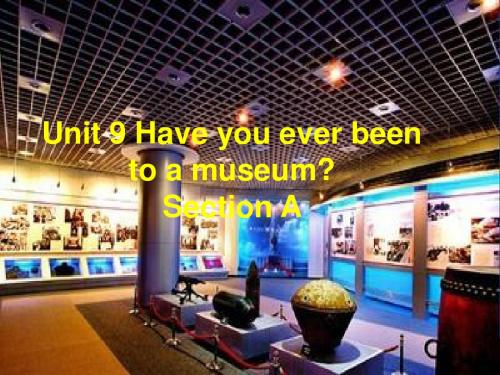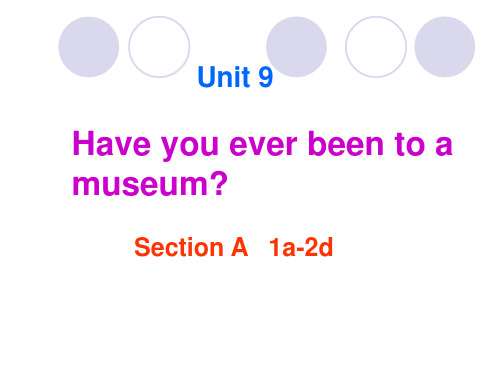新Unit 9 Have you ever been to a museum第一课时教案
- 格式:docx
- 大小:11.80 KB
- 文档页数:2


Unit9 Have you ever been to a museum?一、重点词汇及拓展1. amusement n. 娱乐;游戏e.g. The old ladies played the games just for amusement.老太太们玩这个游戏只是为了取乐。
amuse v. 消遣,逗笑;使开心,使愉快amusing adj. 有趣的,好玩的,好笑的amused adj. 被逗乐的;感到好笑的2.amusement park 游乐场e.g. The amusement park is open from May through October.游乐园从五月到十月开放。
3.somewhere adv. 在何处;到某处pron. 某个地方e.g. Maybe the keys are somewhere in the dining room.也许钥匙在餐厅某个地方。
I need to find somewhere to stay tonight.我得找到今晚要住的地方。
4.camera n.照相机;摄影机;摄像机e.g. I heard your parents bought you a cameras as a gift.我听说你的父母亲给你买了一台照相机作为礼物。
5.invention n.发明;发明物e.g. Do you think mobile phone is a great invention?你认为手机是一个伟大的发明吗?6.invent v.发明;创造inventor n.发明家invention n.发明;发明物e.g. As we all know that Edison invented light bulb.我们都知道爱迪生发明了灯泡。
7. unbelievable adj. 难以置信的;不真实的unbelievably adv. 难以置信地;不真实地unbelievably bad/good 坏得/好得令人难以置信incredible adj. 难以置信的e.g. I still find this story both fascinating and unbelievable.我仍然觉得这个故事非常有趣和难以置信。



Unit 9 Have you ever been to a museum?1.—Have you ever been to …? ---你曾经去过…吗?Yes ,I have. / No ,I haven ’t. ever 曾经 (用于现在完成时。
ever 用于疑问句、否定句)2.(1). have/ has been to + 地名;“曾经去过某地”,现在已经回到原地。
(2). have gone to “已经去某地了”,说话时该人不在现场。
(3). have been in +地点 待在某地,常与时间段搭配。
3. 在英语中,表示“也”的知识归纳如下:A. 否定句中的“也”主语 + neitherneither +助动词/be + 主语 完整的否定句后加either ,但要加逗号隔开。
B. 肯定句中的“也”主语 + tooso +助动词/be+ 主语 完整的肯定句后加too ,且要用逗号隔开。
4.Let sb. do sth 让某人做某事 (sb.应用人称代词的宾格形式)5. go somewhere different 去不同的地方 6. invent v 发明→inventor n 发明家→ invention n 发明lead to sth 导致……lead sb. to sw 引导某人去某地lead sb. to do sth 引导某人干某事7.take the subway 乘地铁①take the/a +交通工具+to +地点“乘坐……” (放于句中) take the train 乘火车 ②by+交通工具 “乘坐……” (放于句尾) by bus 乘公共汽车Eg :I go to school by bus.=I take the bus to school.8.It is a great way to do sth 这是一个做某事的好方法9. go skating 去滑冰10. .on the weekend 在周末11. science museum 科学博物馆history museum 历史博物馆12.all the old movie cameras所有的古老的电影摄影机13.camp in the mountains 在大山里露营14.learn about 了解获知,得知learn about sth.了解有关……的情况15. an amusement park 一个游乐场16. the International Museum国际博物馆17. put up a tent 搭帐篷put up 搭起;举起;张贴rmation信息;资料(不可n.)some informationa piece of information 与about 连用,表示:“关于……的信息”19.It’s unbelievable that+从句“令人难以置信的……”20. make progress 取得进步make progress in 在......方面取得进步21.in such a rapid way 以如此迅猛的方式22.play chess 下棋23.be able to+V原能够做某事24.in the future在将来25.wonder 想要知道= want to know①后接从句eg:I wonder who she is.②也可接“疑问词+不定式”eg: I wonder what to do next.26.I couldn’t believe my eyes我无法相信我的眼睛。

unit 9 have you ever been to amuseum教案1教案题目:Unit 9 "Have You Ever Been to a Museum?"教学目标:1. 学生能够掌握并正确使用本单元的词汇和短语。
2. 学生能够运用所学的句型和表达方式描述博物馆和展览。
3. 学生能够通过听说读写的综合训练,提高自己的综合语言运用能力。
教学重点:1. 本单元的词汇和短语的掌握和运用。
2. 对博物馆和展览进行描述的能力。
3. 学生的听说读写的综合训练。
教学难点:1. 对博物馆和展览进行描述的能力。
2. 学生的听说读写的综合训练。
教学准备:幻灯片、多媒体设备、展示物品、课件、练习册。
教学过程:Step 1: Warm-up (5 minutes)1. Greet the students and ask them if they have ever been to a museum.2. Show some pictures of famous museums and ask the students to name them。
3. Discuss with the students about their experiences in museums and what they have seen。
Step 2: Presentation (15 minutes)1. Present the new vocabulary and phrases related to museums and exhibitions using flashcards or pictures。
2. Introduce the target language structures through a short dialogue between a student and a teacher, using phrases like "Have you ever been to a museum?" and "What did you see there?"3. Model the pronunciation and intonation of the target language structures and have the students repeat after you。
1. 单元重点短语归纳:a science museum? 你曾经去过科学博物馆吗?【重点】2. Have you everbeen tohave/ has been in;;have / has gone to ;【辨析】have/has been to表示“某人曾经去过某地”强调现在已经回来了,不在那(1). have/ has been to里了。
)现在不在青岛E.g.: We have been to Qingdao. 我们去过青岛。
(,强调现在还没有回来,可能在那里或表示“某人到某地去了”(2). have gone to 途中。
)现在在悉尼或途中他们去悉尼了。
(E.g.: They have gone to Sydney.,常与时间段搭配。
(3). have been in +地点:表示“某人在某地待了很长时间”年了。
我在南昌待了3E.g.: I have been in Nanchang for three years.你在中国待了多长时间?How long have you been in China?&【难点】一般过去时与现在完成时的用法比较【重点】3.一般过去时表示过去某个时间发生的事、存在的状态或经常发生的动作。
(1). 说话的侧重点只是陈述一件过去的事情,不强调对现在产生的影响。
) 只说明去桂林的时间1998年他参观过桂林。
( E.g.: He visited Guilin in 1998. 在现在完成时表示动作发生在过去,对现在造成了影响或产生了结果。
不能(2).与确定的过去时间状语连用。
E.g.: Jill has bought a new computer. 吉尔买了一台新电脑。
年了。
I have taught here for fifteen years. 我在这儿教学已经15)我了解这部电影的内容我看过这部电影。
I have seen the film. ()只说明上周看了这部电影(I saw the film last week. 我上周看了这部电影。
路漫漫其修远兮,吾将上下而求索- 百度文库Unit9 Have you ever been to a museum?Period 1Section A 1a——2dI.重点词组1.游乐场amusement park2.某个不同的地方somewhere different3.电影摄像机movie cameras4.了解、学习learn about5.导致、成就lead to6.一项发明an invention7.撘一个帐篷put up a tent8.曾经去过某地have/has been toII. 重点句子1.你曾经去过太空博物馆吗?是的。
/ 不,我没去过。
Have you ever been to the space museum? Yes, I have / No, I haven’t.2. 让我们今天去个不同的地方吧。
Let’s go somewhere different today.3. 我还了解了一些发明,它们成就了彩色电影。
I learned about the inventions that led to color movies, too.4. 我们搭起一个帐篷并且在外面做饭。
We put up a tent and cooked outside.5. 我从没有露营过。
I’ve never been camping.III.听力材料Section A 1bSarah: I'm bored, Claudia. Let's do something different.我很无聊,克劳迪娅,让我们做些不同的事情吧Claudia: Have you ever been to a science museum? 你去过科学博物馆吗、Sarah: Yes, I have. I went to the National Science Museum last year. Have you ever been to a history museum?是的,去过。
Unit 9 Have you ever been to a museum?
(Period 1)
Teacher: 罗军
学习目标
1. 掌握句型Have you ever been to …?的不同情况的问答。
2. 通过学习,学生自己能够编对话。
Teaching procedures
Step 1 : Greeting students
Step 2: Leading-in
1.Self introduction
2.Learn the six places in 1a.
Step 3: Practice
Sentence patterns:
1. A: Have you ever been to…?
B: Yes, I have./ Me, too./So have I.
2. A: Have you ever been to …?
B: No, I haven't./ Me ,neither./Neither have I.
Step 4: Listening (1b)
1.Listen carefully and finish 1b. Then check the answers.
2.Listen again and answer the following questions.(再听一次回答问题。
)
1). When did Sarah go to the National Science Museum?
2). Has Sarah been to a history museum?
3). What does Claudia say about history?
3. Listen and check the answers.
Step 5: Role-play the conversation(2d)
1. Read the conversation and answer the questions(读对话,完成问题。
)
1). When did Anna go to the film museum?
2). What does Jill love about the film museum?
3). What did Jill learn about?
4). Who did Jill camp with on the weekend?
5). Has Anna ever been camping?
2. Read after the recording and role-play the conversation.
3. Recite the conversation in 1 minute and then fill in the blanks.(背诵一分钟然后完成填空。
)
Anna went to the film museum__________. She thinks the film museum is really _________. She has ______ been camping.
Jill went to the film museum in _______. She loves all the old movie cameras, and she learned about the inventions that led to__________. On the weekend, Jill _______ in the mountains with some friends.
Step 7 :Make a conversation.。